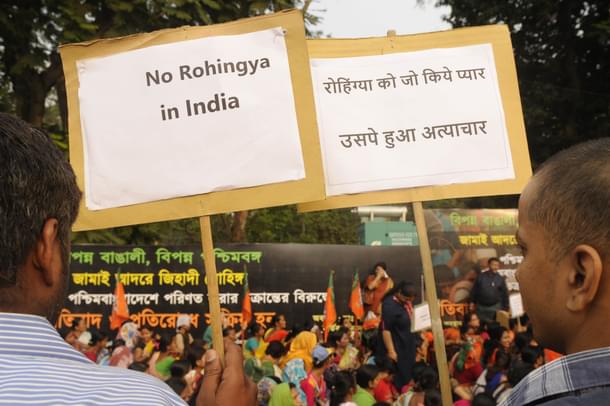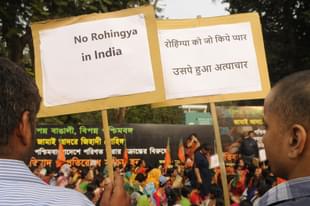Insta
Securing Borders Executive’s Function, SC Cannot Issue Directives: Centre On Rohingya Issue
Swarajya Staff
Apr 10, 2018, 04:56 PM | Updated 04:56 PM IST
Save & read from anywhere!
Bookmark stories for easy access on any device or the Swarajya app.


Flagging a request in the Supreme Court to let more Rohingya Muslims in to the country, the Centre today told the bench led by Chief Justice Dipak Misra that matters pertaining to national security were best left for the government to solve, reports Mail Today. The bench had sought the Centre’s view on permitting more Rohingya Muslims in to India, to which the Ministry of Home Affairs replied in an affidavit:
India is already facing serious problems of infiltration because of its porous borders with other countries which is the root cause of spread of terrorism in the country which is taking thousands of lives of innocent citizens and security personnel. Securing the borders of any sovereign nation is essentially executive function and SC cannot issue a writ directing not only to the Central government but all state governments having a common border to ensure that foreigners enter the territory of India.
Advocate Prashant Bhushan – representing the petitioners challenging the Centre’s decision to deport Rohingya Muslims – alleged that they were being persecuted in Mayanmar and tried to enter India but were being pushed back by the Border Security Force (BSF) who allegedly used chilli spray and stun grenades against them. The Home Ministry in its affidavit refuted these allegations as false and far from the truth.
The Ministry also clarified that under the Passports Act of 1920, any foreigner entering India must be in possession of a valid national passport or internationally recognised travel document that establishes their identity and nationality.
Additional Solicitor General of India Tushar Mehta told the bench that India could not become the refugee capital of the world.
The Government of Myanmar has said that its forces are carrying out a legitimate operation to restore law and order in the country after a series of guerrilla attacks by Rohingyas at an army post left dozens dead last August.
Bhushan claims that Rohingyas were facing persecution in Myanmar and that they must be allowed refuge in India. He claimed that turning them away at the borders was a violation of the principles of non-refoulement.
Justice D Y Chandrachud who is also part of the bench, however clarified that the principle of non-refoulement only prohibits deportation of refugees to a country where they were being persecuted and thus did not apply to those Rohingyas who had not yet entered India.
Also Read:
Why Locals In Jammu See Rohingya Settlement As Part Of An ‘Islamist Project’ And Want Them Out
The Startling Similarities Between Spain’s Catalan And India’s Rohingya Crises




